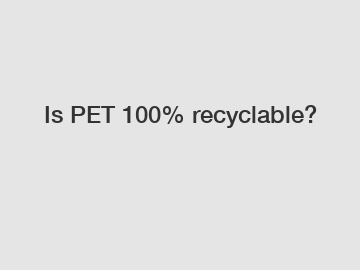Dec. 20, 2023
Environment
Is PET 100% Recyclable?
PET, which stands for Polyethylene Terephthalate, is a type of plastic commonly used for packaging various products, including beverage bottles, food containers, and household items. Recycling is an essential process in reducing environmental waste and conserving resources. However, the question remains: Is PET truly 100% recyclable? In this article, we will explore the recyclability of PET, its limitations, possible solutions, and the overall impact on the environment.
1. The Basics of PET Recycling.

PET is indeed recyclable and has been widely adopted in recycling programs worldwide. Recycling PET involves several stages. First, the collected plastics are sorted based on type, separating PET from other plastics. Next, the sorted PET undergoes a washing process to remove impurities, such as labels and caps. The cleaned PET is then shredded into flakes or pellets, which serve as raw materials for manufacturing new products.
2. Limitations of PET Recycling.
While PET is recyclable, it is essential to understand its limitations. One primary concern is the degradation of plastic during recycling. Each time PET is recycled, it can lose some of its inherent properties, such as strength and clarity. This degradation limits the number of times PET can be recycled before it becomes unsuitable for further use. Furthermore, not all PET products are accepted in recycling programs, particularly those contaminated with food waste or chemicals, which can hinder the recycling process.
3. Challenges Faced by the PET Recycling Industry.
Several challenges contribute to the inefficiency of PET recycling. The foremost challenge is the improper disposal of PET products. Many individuals still discard their PET waste in regular trash bins, leading to increased landfill waste and missed recycling opportunities. Moreover, the vast quantity of PET waste generated globally poses logistical challenges for recycling facilities. Limited infrastructure, lack of proper collection systems, and insufficient funding further impede the recycling process.
4. Innovations in PET Recycling.
Fortunately, researchers and innovators are continuously working towards improving PET recycling methods. One promising approach is chemical recycling, which aims to break down PET into its original monomers for creating new plastics. While still in the experimental stage, this method shows potential in reducing the degradation associated with traditional recycling processes. Other innovations include the development of more efficient sorting techniques, enhanced recycling facilities, and increased public awareness campaigns.
5. Environmental Impact of PET and Recycling.
The environmental impact of PET goes beyond its recyclability. PET production requires fossil fuels and generates greenhouse gas emissions, contributing to climate change. Additionally, improper disposal of PET waste results in pollution of land and water bodies, posing a threat to wildlife and ecosystems. Recycling PET significantly reduces these environmental impacts, as it reduces the need for virgin plastic production and minimizes waste sent to landfills or incineration.
6. Consumer Role in PET Recycling.
As consumers, we play a crucial role in promoting PET recycling. Simple steps like separating PET waste from regular trash, rinsing containers before recycling, and following local recycling guidelines can make a significant difference. Supporting products made from recycled PET, such as clothing, carpets, and packaging, also encourages the demand for recycled materials. By prioritizing recycling and responsible consumption, we contribute to preserving resources and minimizing the environmental footprint of PET.
Conclusion.
In conclusion, PET is indeed recyclable, but not without limitations. While recycling PET helps conserve resources and reduce environmental impact, the degradation that occurs during the recycling process poses challenges. The PET recycling industry also faces hurdles related to waste management and infrastructure. However, ongoing innovations and greater consumer awareness provide hope for improved PET recycling methods. Ultimately, the sustainable future of PET lies in our collective responsibility to prioritize recycling and support efforts to create a circular economy around this versatile material.
The company is the world’s best rPET pellets, rPET pellets, rPET pellets supplier. We are your one-stop shop for all needs. Our staff are highly-specialized and will help you find the product you need.
If you are interested in sending in a Guest Blogger Submission,welcome to write for us!
All Comments ( 0 )